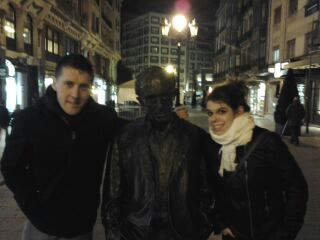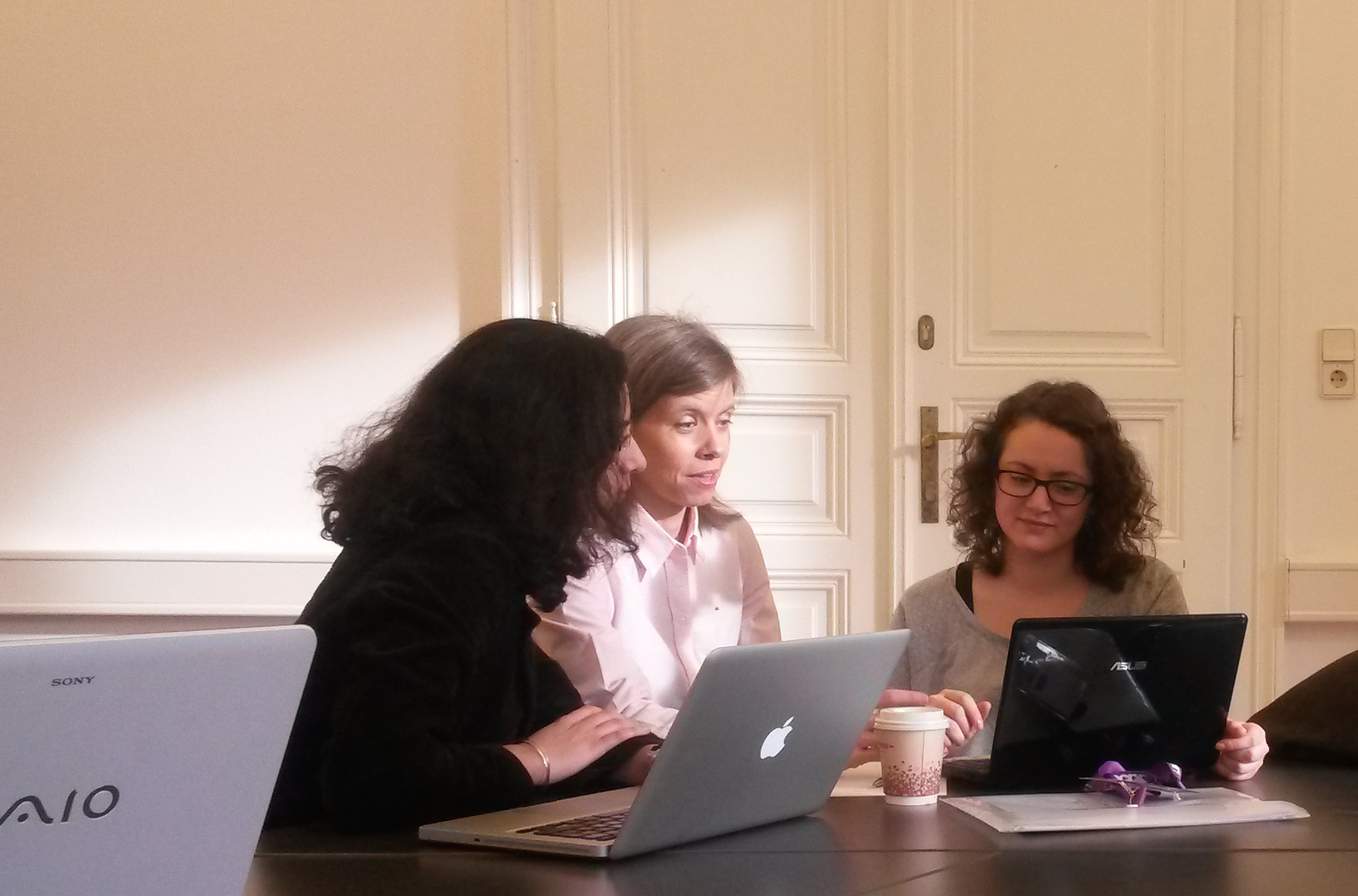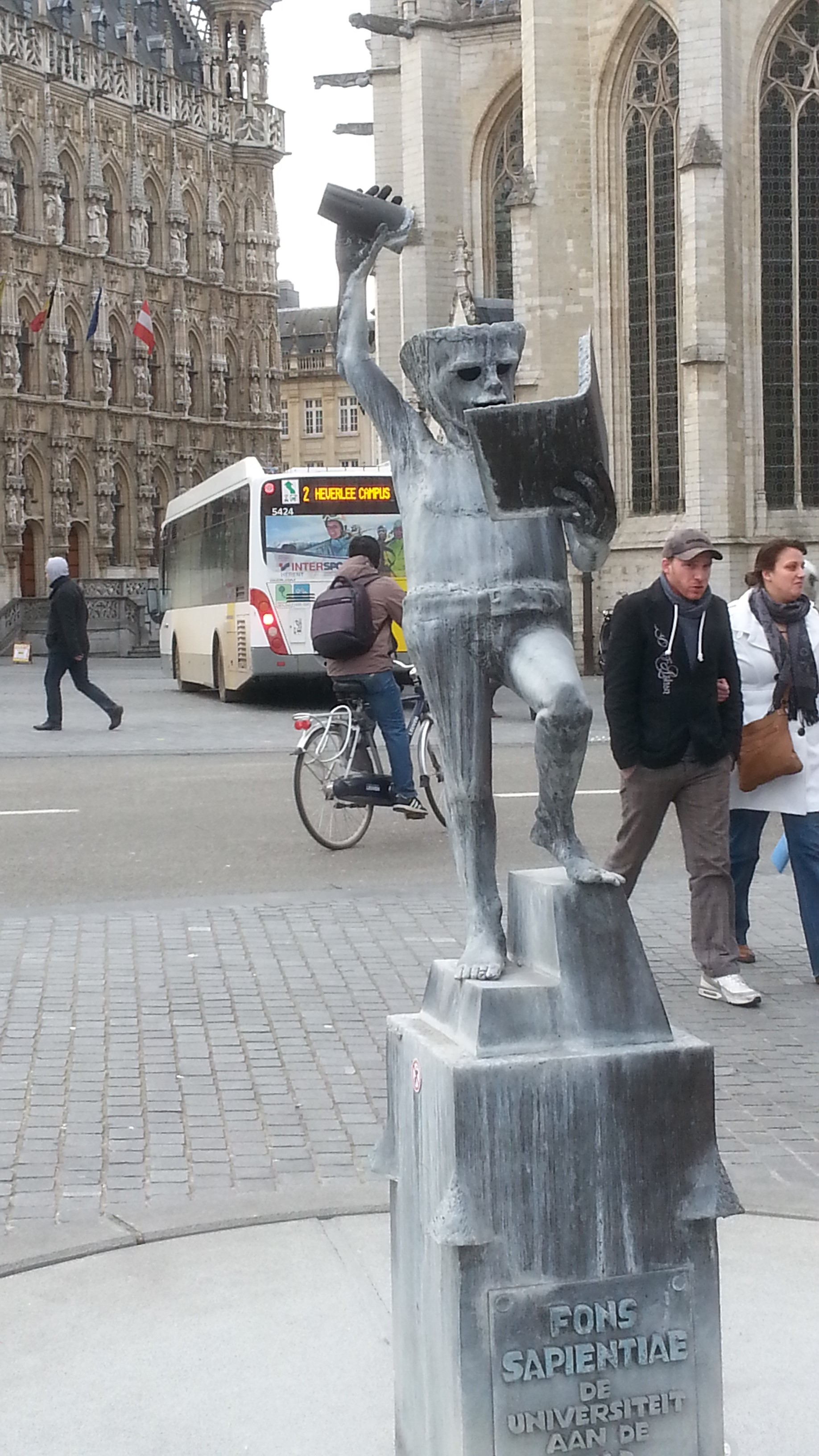Navigation:
Theme 1 - Management & Employees
Theme 2 - Inclusion & Exclusion
Theme 3- Employee wellbeing and work life quality
Back to eNewsletter Main Page
| Theme 1 - Management & Employees
The members of Theme 1 – Sara, Clara and Mona, joined by Ben from Theme 2, have met in January for a Changing Employment workshop on multinational corporations (MNC) and industrial relations at the University of Oviedo in Spain (the home institution of Mona).  Participating ESRs exchanged presentations on national models of employment relations in France, Germany, Belgium and Spain and discussed the implications of a sector focus in industrial relations as proposed by Bechter et al (2012) in their article “Sectors or countries? Typologies and levels of analysis in comparative industrial relations”. They also discussed typologies of MNCs and how these could be understood in the academic field of comparative industrial relations. The next workshop is planned to take place at ULB in Brussels in April. A workshop report written by Ben is available here (link to the report)Additionally, Sara and Mona have been accepted as presenters to the Labour and Employment Relations Association (LERA) conference taking place in May 2014 in Portland, USA. Sara and Mona will present a joint paper as part of the conference´s symposium on the international comparison of collective bargaining. The paper compares employment relations on the EU-level with country studies of national employment relations.Mona has successfully handed in an abstract with the Global Labour Journal (GLJ) for a special issue on worker representation in global production networks, which is planned to be published this year and to which she will contribute with an article on employment relations along ArcelorMittal’s global value chain.Sara is currently working on a joint paper to be submitted in April for a collective contribution to the international conference «Les marges du travail et de l’emploi- Formes, enjeux, processus » at the 14th Journées Internationales de Sociologie du Travail in Lille in June. She has also attended events in Brussels related to work and social rights, as for instance the conference «Femmes, Travail et Inégalités» on the International Working Women’s Day: (http://www.diversite-europe.eu/?ai1ec_event=conference-femmes-travail-et-inegalites&instance_id.)Clara’s proposal regarding a presentation based on the results of her fieldwork in Spain has been accepted to the conference in Lille in June. In July, she plans to go to the XVIII ISA World Congress of Sociology “Facing an unequal World: Challenges for Global Sociology”, taking place in Yokohama, Japan. At the beginning of next academic year, Clara will follow a methodological course at CEU (Central European University, in Budapest). Participating ESRs exchanged presentations on national models of employment relations in France, Germany, Belgium and Spain and discussed the implications of a sector focus in industrial relations as proposed by Bechter et al (2012) in their article “Sectors or countries? Typologies and levels of analysis in comparative industrial relations”. They also discussed typologies of MNCs and how these could be understood in the academic field of comparative industrial relations. The next workshop is planned to take place at ULB in Brussels in April. A workshop report written by Ben is available here (link to the report)Additionally, Sara and Mona have been accepted as presenters to the Labour and Employment Relations Association (LERA) conference taking place in May 2014 in Portland, USA. Sara and Mona will present a joint paper as part of the conference´s symposium on the international comparison of collective bargaining. The paper compares employment relations on the EU-level with country studies of national employment relations.Mona has successfully handed in an abstract with the Global Labour Journal (GLJ) for a special issue on worker representation in global production networks, which is planned to be published this year and to which she will contribute with an article on employment relations along ArcelorMittal’s global value chain.Sara is currently working on a joint paper to be submitted in April for a collective contribution to the international conference «Les marges du travail et de l’emploi- Formes, enjeux, processus » at the 14th Journées Internationales de Sociologie du Travail in Lille in June. She has also attended events in Brussels related to work and social rights, as for instance the conference «Femmes, Travail et Inégalités» on the International Working Women’s Day: (http://www.diversite-europe.eu/?ai1ec_event=conference-femmes-travail-et-inegalites&instance_id.)Clara’s proposal regarding a presentation based on the results of her fieldwork in Spain has been accepted to the conference in Lille in June. In July, she plans to go to the XVIII ISA World Congress of Sociology “Facing an unequal World: Challenges for Global Sociology”, taking place in Yokohama, Japan. At the beginning of next academic year, Clara will follow a methodological course at CEU (Central European University, in Budapest).
[top]
Theme 2 - Inclusion & Exclusion
Theme 2 ESRs met during research methods training in Vienna in February where they further discussed the  project of bringing together their individual research into a book, building upon the common theme of ‘Inclusion/Exclusion’. The group decided upon a timeline from launching the call for chapters in April 2014 to the actual publishing planned for December 2015. In line with the European dimension of the ITN, Radek, Karima, Ben, Mateusz and Nina will reach out to universities and research centres in the countries where they are based and have studied to ensure a broad dissemination of the call and an interesting range of contributions. The call will also be circulated through the Marie Curie ITN ‘ChangingEmployment’. Topics that will be covered in this book are embedded in an analysis of global changes in employment in particular in relation to migrant workers and address issues around belonging and citizenship, precarious work, return migration, female migrants’ agency and migrants’ inclusion into multinational companies. The group plans on enriching the project with visual data from various sites where research takes place. project of bringing together their individual research into a book, building upon the common theme of ‘Inclusion/Exclusion’. The group decided upon a timeline from launching the call for chapters in April 2014 to the actual publishing planned for December 2015. In line with the European dimension of the ITN, Radek, Karima, Ben, Mateusz and Nina will reach out to universities and research centres in the countries where they are based and have studied to ensure a broad dissemination of the call and an interesting range of contributions. The call will also be circulated through the Marie Curie ITN ‘ChangingEmployment’. Topics that will be covered in this book are embedded in an analysis of global changes in employment in particular in relation to migrant workers and address issues around belonging and citizenship, precarious work, return migration, female migrants’ agency and migrants’ inclusion into multinational companies. The group plans on enriching the project with visual data from various sites where research takes place.
Besides working on the book, Theme 2 is also involved in ongoing dissemination activities by making efforts to present as a team at international conferences on migration. For the moment they are applying for the 17th Nordic Migration Conference at Copenhagen University taking place from 13th to 15th of August 2014. The focus of the conference ‘Flows, places and boundaries – migratory challenges and new agendas’ - fits the research interest of most of the Theme 2 ESRs. The ESRs are applying with their individual papers ranging from topics such as precarious migrant workers, discrimination, female Polish migrant workers, return migrants to migrant’s individual subjectivity for the workshop organized by the network’s new experienced researcher Olena Fedyuk and Neda Deneva on ‘Reconfigurations of 'ir/regularity' through practices of labour: experiences of migrants from new member states and third country nationals within the EU’.
The group have also proposed a panel at the European Consortium for Political Research’s annual general conference, which, if accepted will involve all members of the Theme including Dr Olena Fedyuk and Prof. Paul Stewart as discussants. The outcome of this proposal will be known my mid-March, with the conference itself in Glasgow in September 2014.
[top]
Theme 3 - Employee wellbeing and work life quality
Following decisions in Paris’ annual networking meeting for Theme 3 to meet regularly, a gathering was organized at Catholic University of Leuven in mid-January. Pille, Pedro and Laurens met to discuss further developments in each research project, so everyone could be more intertwined with each other’s projects. This was seen as valuable due to the fact that each Theme 3 member was able to develop their project’s ideas and expectations and receive an ‘out of the box’ feedback from fellow Theme members. The discussed topics were related to literature review in the case of Pedro’s project, interviewing process in Laurens’s case methodological and operationalization issues for Pille. research project, so everyone could be more intertwined with each other’s projects. This was seen as valuable due to the fact that each Theme 3 member was able to develop their project’s ideas and expectations and receive an ‘out of the box’ feedback from fellow Theme members. The discussed topics were related to literature review in the case of Pedro’s project, interviewing process in Laurens’s case methodological and operationalization issues for Pille.
Besides the individual projects, parallel activities to disseminate the Marie Curie ChangingEmployment to the wider public were discussed, with main focus on seminars and joint papers that can be produced together as a Theme. However, such plans are to take into action further on in time. The Theme 3 had also time to explore the city and meet other ESRs that are based in Leuven and in Brussels, i.e. Ben and Sara respectively. As born and raised in Leuven, Laurens was the Theme’s guide culturally and gastronomic-wise. However, Pedro has to emphasize the brilliant restaurant ‘O Fado’, placed just parallel to the ‘Oude Markt’, that serves a great bacalhau a bras.
During the spring months, the main focus of Theme 3 will be on further development of theoretical background of the projects, fieldwork and preparing for the first conference presentations. Pille had her introductory seminar (so-called PM-seminar) at her 'home department' of Sociology and Work Science at the University of Gothenburg in the beginning of February and is aiming to present her first findings from the project at the Nordic Working Life Conference, taking place in Gothenburg in June under the heading of 'Threats and Possibilities Facing Nordic Working life'. Laurens has been accepted to present at the conference 14th Journées Internationales de Sociologie du Travail in Lille in June.
|